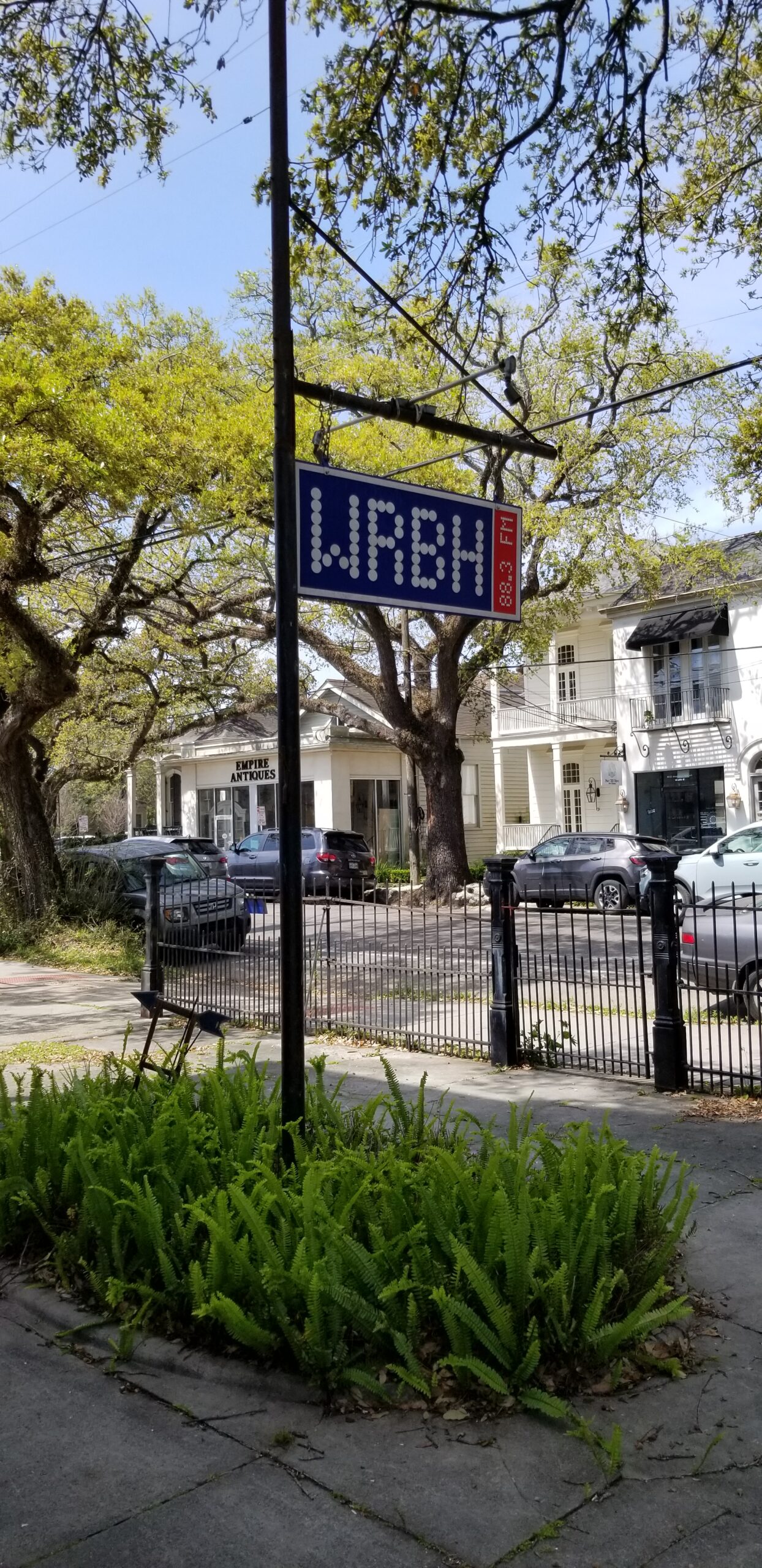
The sign standing outside of WRBH’s Magazine Street studio. (Photo by: Joey Girardot)
As its website states, WRBH 88.3 FM began in 1975 as the dream of local mathematician Dr. Robert McClean, a blind man who decided to create a service that would read written content—both news and literature—directly on the FM dial, rather than on sideband frequencies that require special radios and technical know-how to access. Now, almost half a century later, that dream is alive and well, and WRBH stands as not just the nation’s only full-time FM reading radio service; it is in fact one of only three in the world. On March 21st, 2022, I was able to visit their studio, a repurposed 19th century Victorian building on Magazine Street, and ask them some questions. What came out of this meeting was not one but two separate interviews, first with Assistant Program Director Del Agnew, and then with Natalia Gonzalez and Tim Vogel, the Executive and Assistant Executive Directors, respectively.
Over the course of an hour, I was shown around the studio and administrative space, and followed up the tour by asking the staff a series of questions surrounding their history, their mission, and their connection to the city of New Orleans. While they have expanded their reach by streaming broadcasts over the internet alongside their daily services, they still consider themselves a local radio station at the core. “We do have our mission, obviously,” Del says, “but also, with that it is very much a community radio station, so having a good relationship with your listeners and the people who volunteer is very important, and I think a place like New Orleans definitely feeds into that.” Tim and Natalia agreed, with Tim adding, “We see ourselves as part of the community… we’re a Gulf South radio station, we’re a New Orleans radio station.”
This emphasis on local presence can also be felt through the volunteer readers themselves, whose varied accents and spoken languages reflect the diversity of the greater New Orleans area, from the Ninth Ward to the Bonnet Carré Spillway. There is no prejudice against regional-sounding voices, which allows for an eclectic mix and local feel that colors each hour of broadcasting. Even in the digital age, then, what keeps WRBH feeling like a New Orleans station is the fact that it sounds like one. Acknowledging the response from the station’s loyal listeners, Del stated that “it’s very comforting not only to hear a book being read, but also the voice that’s reading to you. We get a lot of feedback about people developing attachments to certain readers and [becoming] fans [of them].” Rather than neutralize the local flavor of the station, an increased online presence has allowed people from outside the city to tune in as well, experiencing this unique service from afar.
Yet this same internet that allows for a wider audience has also led to an overall decrease in radio’s importance as a source of information, or even as a service for the blind, who now might turn to various apps and programs designed to accommodate them. With that in mind, the continued existence of WRBH—now in its fifth decade of operation—stands as even more impressive. “I’m very proud of the fact that we’ve been able to stay alive for this long,” Natalia expressed. More than simply surviving, though, she believes the station is thriving, thanks to New Orleans embracing what they do. In an observation that could just as easily refer to either the city or to the station, she notes, “we have been through it all… I’ve seen it all here, and we keep on going… We are resilient, and it shows in everything we do.”
WRBH accepts donations and volunteers through their website, found here. A recording of both interviews is available to listen to in full via the player below. In these full interviews, you can hear conversations I was not able to include like the difficulties of finding funding, how they choose what gets read on the station, and Natalia’s amazing story about the station’s experience after the devastation of Hurricane Katrina.
 NOLAbeings
Multimedia artist Claire Bangser created NOLAbeings as a portrait-based story project that marries...
NOLAbeings
Multimedia artist Claire Bangser created NOLAbeings as a portrait-based story project that marries...
 Data corner: Adobe Suite (create a PDF, social media graphic, presentation, edit a photo and video
Data corner is where you go to work with analytics and top tech skills. It takes on everything from PERL and SQL to Canva and Sprout Social.
Data corner: Adobe Suite (create a PDF, social media graphic, presentation, edit a photo and video
Data corner is where you go to work with analytics and top tech skills. It takes on everything from PERL and SQL to Canva and Sprout Social.
